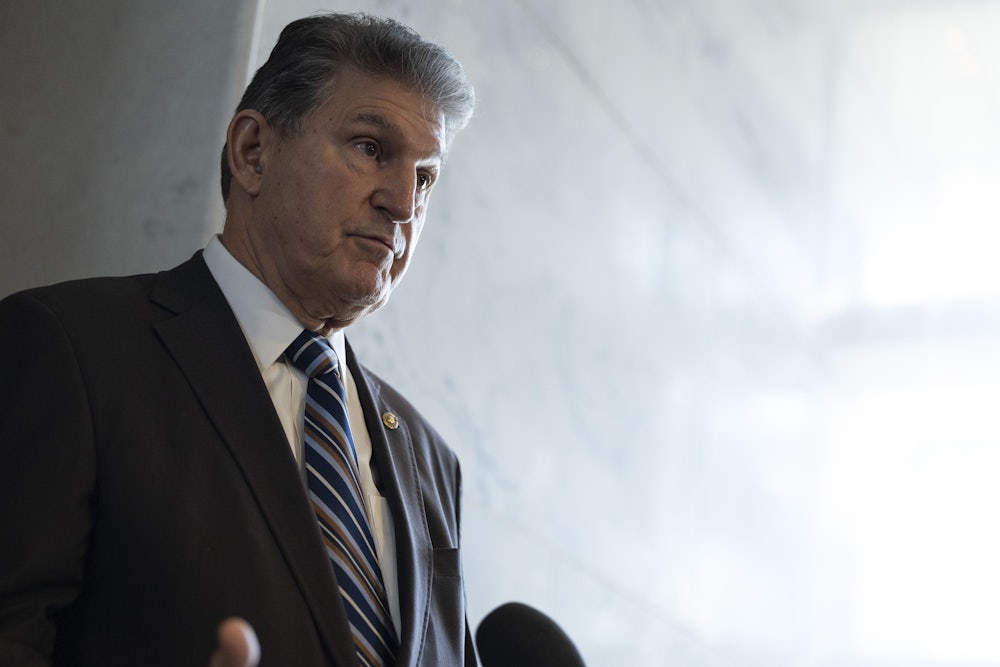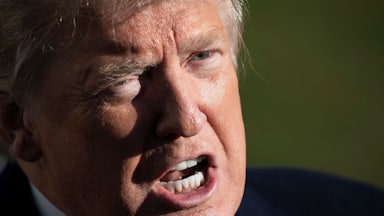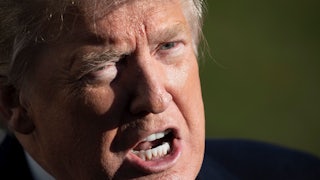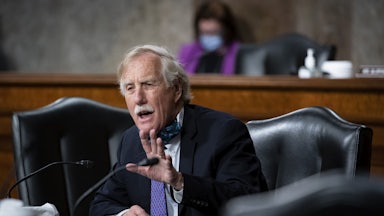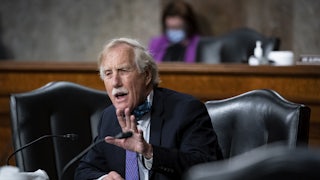In the waning days of December, with their legislative agenda exhaling a painful death rattle that culminated in the demise of the House-passed version of the Build Back Better Act, Senate Democrats began to pivot their attention to passing some form of voting rights legislation.
For lawmakers in the upper house, it was a bit of déjà vu. Democrats spent the better part of the past year trying to pass voting rights bills, including the Freedom to Vote Act, which they crafted with the hopes of obtaining the GOP support that previous attempts had failed to garner. As everyone knows by now, a minimum of 10 Republican votes are necessary to circumvent the Senate filibuster; no Republicans ended up supporting the Freedom to Vote Act, and only GOP Senator Lisa Murkowski supported the John Lewis Voting Rights Advancement Act, which restores a key provision in the 1965 Voting Rights Act gutted by the Supreme Court. Throughout the fall, a group of moderate Democrats regularly huddled together, discussing potential changes to Senate rules that might allow their efforts to succeed.
The Senate recessed at the end of the year without making any decisions on potential rule changes, and with two Democrats holding out against eliminating the filibuster outright—Senator Joe Manchin, who torpedoed the Build Back Better Act the week before Christmas by saying he would vote against it in its current form, and Senator Kyrsten Sinema, who has said she would not support ending the rule requiring a 60-vote threshold for legislation to advance in the upper chamber.
Senate Democrats returned to Washington this week determined to move forward in their quest to “restore the Senate.” In a letter to colleagues on Monday, Majority Leader Chuck Schumer pledged that Democrats would move forward on their quest to pass voting rights legislation and return the Senate to a semblance of functionality, citing the impending anniversary of the deadly attack on the Capitol on January 6, 2021, as an impetus for action.
“January 6th was a symptom of a broader illness—an effort to delegitimize our election process, and the Senate must advance systemic democracy reforms to repair our republic or else the events of that day will not be an aberration—they will be the new norm,” Schumer said in his letter. “Given the urgency of the situation and imminence of the votes, we as Senate Democrats must urge the public in a variety of different ways to impress upon their Senators the importance of acting and reforming the Senate rules, if that becomes a [prerequisite] for action to save our democracy.”
Democrats are continuing to press forward with the Freedom to Vote Act and the John Lewis Voting Rights Advancement Act, despite Republican efforts to block both bills last year. Combined, the two bills are able to offer a response to the spate of restrictive voting measures considered or passed in Republican-led states in the wake of Donald Trump’s 2020 electoral loss.
Schumer told reporters on Tuesday that he understood that enacting a rules change in the Senate would be an “uphill fight.” “I don’t want to give anybody the illusion that we’re there. But hopefully we can get 50 of us to come to an agreement,” Schumer said.
Senator Amy Klobuchar said on Tuesday that Democrats would stop short of ending the filibuster, instead favoring some kind of reform that presumably would make it easier to pass voting rights legislation. The problem: Formally changing Senate rules requires a two-thirds majority, or 67 votes. If you think it’s hard to get 10 Republican votes to break a filibuster, just try getting 17 to change the rules. And Republicans are signaling their opposition to any change in the rules: Senate Minority Leader Mitch McConnell said on Tuesday that Schumer appeared “hell-bent to break the Senate.”
“There is no such thing as a narrow exception. This is genuine radicalism. They want to turn the Senate into the House,” McConnell said. Republicans argue that the restrictive measures do not amount to voter suppression, pointing to record-high turnout in 2020. But many of the new laws considered and passed in the wake of Trump’s loss and his repeated lies about a rigged election include provisions to make voting more difficult, such as by making it harder to obtain absentee ballots and closing polling places, as well as empowering partisan actors to interfere with the elections process.
Manchin said on Tuesday evening that it’s his “absolute preference” a rules change be accomplished with a two-thirds majority. “I have to exhaust everything in my ability to talk and negotiate with people before I start doing things that other people might think need to be done,” he said.
But Manchin did not draw a red line, meaning that he could potentially get on board with taking the “nuclear option,” a procedural gambit that allows the Senate to change its rules with just a simple majority. The nuclear option was invoked by Democrats in 2013 to allow most nominees to be confirmed with a simple majority, and then by Republicans in 2017 to enable Supreme Court nominees to be confirmed with 51 votes.
“My belief is that any effort to reform or amend Senate rules and procedure that’s only done with a simple majority will be perceived by Republicans as basically an act of war,” said Tré Easton, the deputy director of the Battle Born Collective, a liberal communications group, and a former Senate aide. “So it doesn’t really matter the actual rules change that occurs because Republicans are going to oppose it.”
Manchin told reporters later on Tuesday that he is willing to get rid of the cloture vote on the motion to proceed for a bill, which allows the minority to block bills without debating them. He also said he would support changing the 60-vote threshold for invoking cloture to end the filibuster, instead requiring three-fifths of the senators present at the time of the vote, which would require more members of the minority to be present to block a bill. But as long as Sinema remains opposed to changing the 60-vote threshold, that particular rule is unlikely to change.
Alex Tausanovitch, the director of campaign finance and electoral reform at the liberal Center for American Progress, wrote a report published this week arguing that American democracy faces three critical threats in future elections: partisan officials refusing to certify results, partisan election workers tampering with the vote or preventing people from voting, and Congress voting to overturn the election results. (The idea that state legislatures may overturn the will of the people, McConnell said on Tuesday, is “ridiculous on its face.”)
The John Lewis Voting Rights Advancement Act and Freedom to Vote Act address some of these threats, but Tausanovitch argues that there is more Congress can do to protect the sanctity of future elections. “This is a really big problem, and it’s an evolving problem, and those two bills go a long way to addressing the possibility of preventing people from voting,” Tausanovitch told The New Republic.
One additional action Congress could take is reforming the Electoral Count Act, the complicated law that established the procedures for counting Electoral College votes, including setting the deadlines for states to certify their election results, outlining the vice president’s role in presiding over the count and reading state returns, and providing a process for lawmakers to challenge the validity of some electors. “I think addressing all of those things is in play,” Tausanovitch said.
Although Republicans are unlikely to suddenly change course on the Freedom to Vote Act or the John Lewis Voting Rights Advancement Act, there could be room for bipartisanship on the Electoral Count Act. The statute contains a multitude of ambiguities, such as a lack of clarity as to whether the vice president’s role is merely ceremonial, or if he or she has the power to decide which slate of electors he or she wishes to certify. Several Trump allies placed the act at the center of their arguments for overturning the election, including Trump lawyer John Eastman, in a memo theorizing that the statute is unconstitutional and that then–Vice President Mike Pence could ignore it.
Conservatives and progressives alike have argued that the Electoral Count Act, passed in 1887 in the wake of a contested presidential election a decade earlier, is ripe for reform. The New York Times reported in December that the House select committee on January 6 could recommend changes to the statute, to prevent future elections from hinging on interpretations of the confusing law. GOP Senator Susan Collins called the statute “vague and ambiguous” and argued it “contributed to some of the confusion on January 6.”
“A change that I would like to see personally, is to make very clear that the vice president does not have the power to overturn the electoral counts of the states,” Collins told reporters on Wednesday. “Fortunately, on January 6, we had a vice president, Mike Pence, who was strong and did not give in to pressure from President Trump. But what if he had, or what if a future vice president decided to play political games with the Electoral Count Act? So we need to make it very clear.”
McConnell told Politico Wednesday that the act “obviously has some flaws” and “it is worth, I think, discussing.” When asked later by reporters if he would be interested in offering reform of the Electoral Count Act instead of the other voting rights legislation, McConnell replied, “Wholly aside from all of the other things they are discussing, this is something worth discussing.”
But reforming the Electoral Count Act at the expense of other voting rights measures will be unpopular with Democrats, even if they support streamlining the Electoral College certification process. “If all we do is amend the Electoral Count Act, we’re leaving the biggest threats to democracy unanswered,” Tausanovitch said.
Among those biggest threats, specifically, is voter suppression at the ballot box. “By the time you got to where Congress is counting the state’s electoral votes, it’s too late,” Easton said. “The Electoral Count Act is something that absolutely should be modernized. But that’s not the heart of the problem.”
Schumer told reporters on Tuesday that he would not accept reforming the Electoral Count Act in lieu of passing other voting rights legislation. “That makes no sense,” Schumer said. “If you’re going to rig the game and then say, ‘Oh, we’ll count the rigged game accurately,’ what good is that?”
Democratic Senator Raphael Warnock echoed this point to reporters. “What good is the certification if I don’t get to cast my vote in the first place? That’s what we’re dealing with,” Warnock said.
Senator Jeff Merkley, who like Warnock worked on crafting the Freedom to Vote Act, noted that the Electoral Count Act only addresses presidential elections.
“That’s about one day every four years. It’s not about all of the federal elections that take place, the primaries and general elections that take place every two years, that are being so deeply corrupted by Republican state legislatures,” Merkley told The New Republic.
Democratic Senator Chris Coons told The New Republic that he would be open to looking at “anything we can do to improve the predictability, security, stability of our electoral process.” But he later clarified that he was “in no way saying” that Democrats should work on reaching a compromise on the Electoral Count Act while dropping the Freedom to Vote Act and the John Lewis Voting Rights Advancement Act.
“It’s not an either/or, it’s a both/and,” Coons said.
